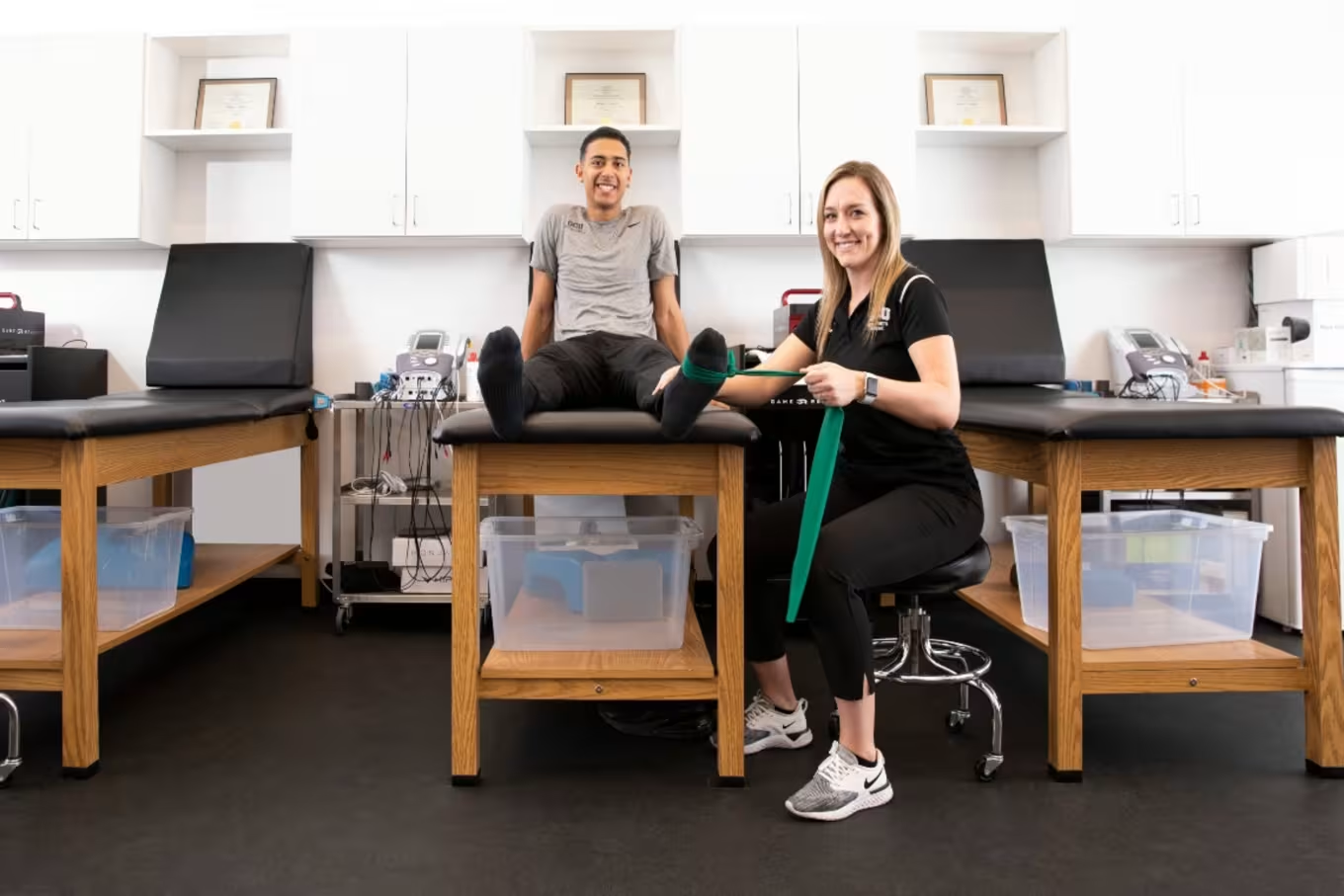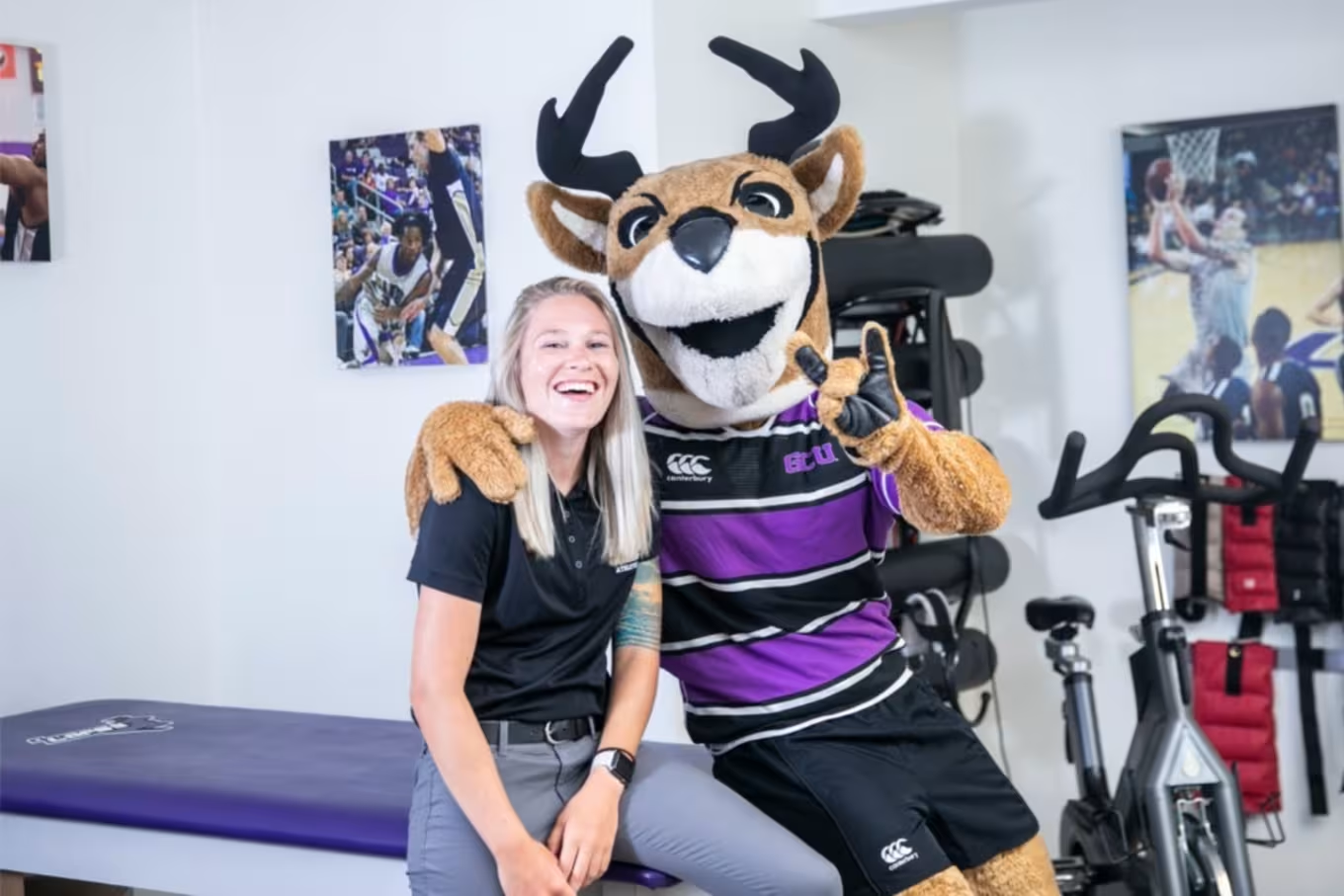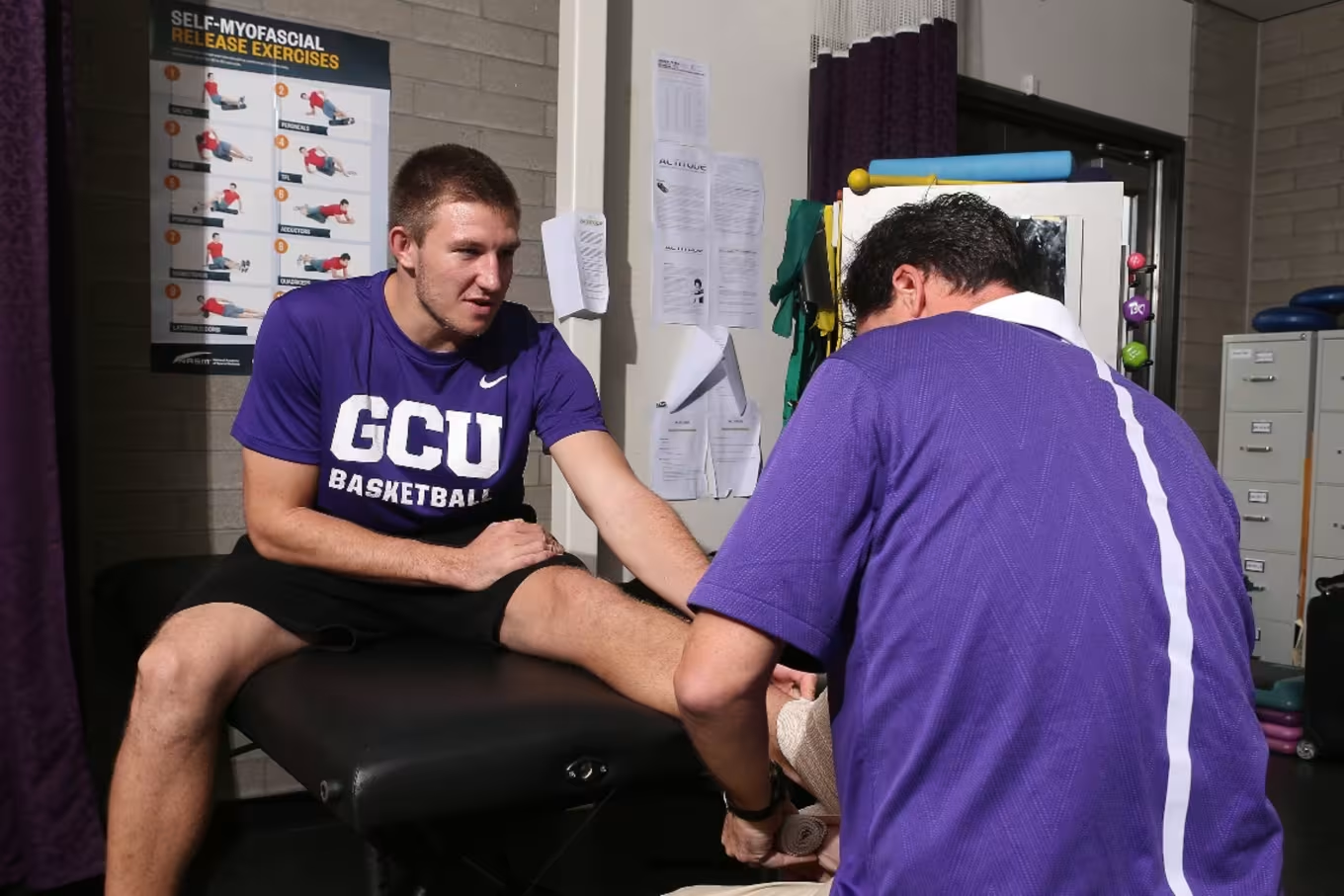Master of Science (MS) in Athletic Training

Master of Science (MS) in Athletic Training
journey today.

We're here to help.
Eligibility for this athletic training master’s is dependent on specific program requirements, including admission, clinical requirements and the application process. This degree is part of the Athletic Training Centralized Application System’s (ATCAS) centralized application portal. Students interested in the MSAT at GCU should apply using the ATCAS system. Complete the form on this page to get started.
To meet all CAATE accreditation standards and guidelines, as well as liability and health precautions, all students must complete the following information 30 days prior to starting their first clinical course to the Office of Field Experiences:
Failure to meet these standards and guidelines may result in the loss of your clinical spot and require reapplication to this degree program.
Admission to the athletic training program requires you to meet the following academic requirements:
General Prerequisite (Actual Prerequisite Course)
*CAATE requirement (Standard 54).
The application process to this degree program is usually swift and seamless as long as you adhere to specific application requirements and meet application deadlines, such as:
The Master of Science in Athletic Training is currently accredited by the Commission on Accreditation of Athletic Training Education (CAATE), 2001 K Street NW, Third Floor North, Washington, DC 20006 USA. In addition to benefitting from programmatic accreditation, you will also be attending an institutionally accredited university.
The Higher Learning Commission has continually accredited GCU since 1968. The College of Nursing and Health Care Professions shares the university’s commitment to upholding the principles and standards established by our accrediting bodies. Institutional accreditation is a reflection of our commitment to providing quality education and comprehensive curriculum for our students.

Athletic trainers tend to have a passion for both science and helping people heal. If you think athletic training is the career for you, GCU has prepared answers to your most frequently asked questions about the degree program with the intent of helping you reach your career goals.
Every athletic training degree has specific eligibility requirements such as a required GPA or course-specific grade requirements. One prerequisite for this degree program is an undergraduate degree in a related major. A bachelor’s degree curriculum may also provide the opportunity to build out-of-classroom experiences and pursue related volunteer opportunities.
The athletic training field is poised for growth in the foreseeable future. According to the BLS, the estimated job growth rate for athletic trainers from 2023 to 2033 is 13%, much faster than average.4 Additionally, athletic trainers can now pursue employment across a wider range of settings. Aside from sports organizations, athletic trainers may apply to jobs in occupational care, performing arts and many other settings.5
While these both have a focus on athletic health, they work differently within the industry. Sports medicine is a medical discipline that focuses on treating athletes with sport-related injuries. Meanwhile, athletic trainers help create plans to rehabilitate athletes, prevent sport-related injuries and often work on-the-spot to assist athletes during sporting events.
Physical therapists and athletic trainers require different schooling and credentials. However, you may be able to apply for physical therapy school with an undergraduate athletic training degree, provided that it meets the physical therapy school’s admission requirements. Alternatively, you might consider earning a Bachelor of Science in Exercise Science with an Emphasis in Pre-Physical Therapy degree. You will need to earn your doctoral degree in physical therapy to practice as a physical therapist.6
As an athletic trainer, you would be responsible for reducing the risk of athletic injuries, as well as providing emergency and stabilizing care when injuries do occur. If you’re passionate about both sports and health science, you may feel called to serve your community as an athletic trainer.
At GCU, you will have opportunities to prepare for certification as a professional athletic trainer while being immersed within our Christian learning environment. As a Christian university, GCU emphasizes servant leadership and professional ethics.
This athletic training degree is offered by our College of Nursing and Health Care Professions. Athletic training is recognized by the American Medical Association (AMA), Health Resources Services Administration (HRSA) and the Department of Health and Human Services (HHS) as an allied healthcare profession.2
As a student in the MSAT program, you will participate in on-campus lectures, hands-on labs, simulations and clinical experiences at local athletic and rehabilitation facilities. As an on-campus student, you will have access to our many campus life activities and amenities. Enjoy being surrounded by like-minded students as you work to pursue your professional ambitions.
Upon completion, you will be eligible to sit for the Board of Certification (BOC) exam to obtain athletic training certification. Nearly every state requires a certification, and it typically requires that athletic trainers graduate from a program accredited by the Commission on Accreditation of Athletic Training Education (CAATE).3 GCU’s master’s in athletic training is CAATE-accredited.

This advanced, on-campus degree program was designed to align with industry expectations and certification requirements. You will complete supervised clinical hours in a professional setting to apply what you’ve been taught in classes and labs.
You will also be required to complete a capstone project at the end of the program. This project is intended to prepare you to be a clinical scholar and distribute research relevant to the athletic training field.
Some core topics you can expect to cover in this program include:
Medical condition evaluation and diagnosis
Emergency management
Athletic training research methods and statistics
Biomechanics
Psychosocial conditions
Kinetic chain and spine analysis
The athletic training degree teaches skills and knowledge in each of the five domains of professional practice:
The Master of Science (MS) in Athletic Training program at Grand Canyon University is designed to prepare graduates to pursue employment as athletic trainers in various clinical and educational settings. These may include schools, colleges and universities, rehabilitation clinics and hospitals, as well as emerging settings in amateur and professional sports.1
As an athletic trainer, you would be responsible for reducing the risk of athletic injuries, as well as providing emergency and stabilizing care when injuries do occur. If you’re passionate about both sports and health science, you may feel called to serve your community as an athletic trainer. Our MS in Athletic Training program was developed to prepare you for a career in the diagnosis, treatment and rehabilitation of athletic injuries.

According to the U.S. Bureau of Labor Statistics (BLS), colleges and universities are one of the largest employers of qualified athletic trainers.1 In these settings, they may support NCAA athletic divisions as well as intramural and club sports programs.
Jobs with an athletic training degree are also commonly available in:1
Hospitals
Fitness centers
Physicians’ offices
Law enforcement and military departments
Professional sports teams
Performing arts organizations
Estimated job growth rate for athletic trainers from 2023 to 20334
Campus: $8,250 per semester [More Info]
Up to 12 credits or 1/3 of the total program requirements in transfer (whichever is less)
Credits: Fill out the Lopes Eval to find out what will transfer
Admission Requirements (Master's)
OR 2.5+ Unweighted GPA and
Admission requirements may differ based on degree level, program and modality, or transfer status. Some programs of study may require a higher GPA and/or other qualifying criteria for admission. Please review full admission and program requirements in the University Policy Handbook.
* Degree must be from an accredited college or program that has been approved by GCU.
** Combined verbal/quantitative, after August 2011 (1,000 combined verbal and quantitative, prior to August 2011).
1 U.S. Bureau of Labor Statistics. (2024, April 17). Athletic Trainers: Work Environment. Occupational Outlook Handbook. Retrieved Aug. 27, 2024.
2 National Athletic Trainers’ Association. (n.d.). What Is Athletic Training? NATA. Retrieved Aug. 27, 2024.
3 U.S. Bureau of Labor Statistics. (2024, April 17). How To Become an Athletic Trainer. Occupational Outlook Handbook. Retrieved Aug. 27, 2024.
4 COVID-19 has adversely affected the global economy and data from 2020 to 2023 may be atypical compared to prior years. Accordingly, data shown is effective September 2024, which can be found here: U.S. Bureau of Labor Statistics, Occupational Outlook Handbook, Athletic Trainers, retrieved Oct. 29, 2024.
5 Sitzler, B. (2023, March 21). The State of Employment for Athletic Trainers. National Athletic Trainers’ Association. Retrieved Aug. 28, 2024.
6 U.S. Bureau of Labor Statistics. (2024, April 17). How To Become a Physical Therapist. Occupational Outlook Handbook. Retrieved Aug. 28, 2024.